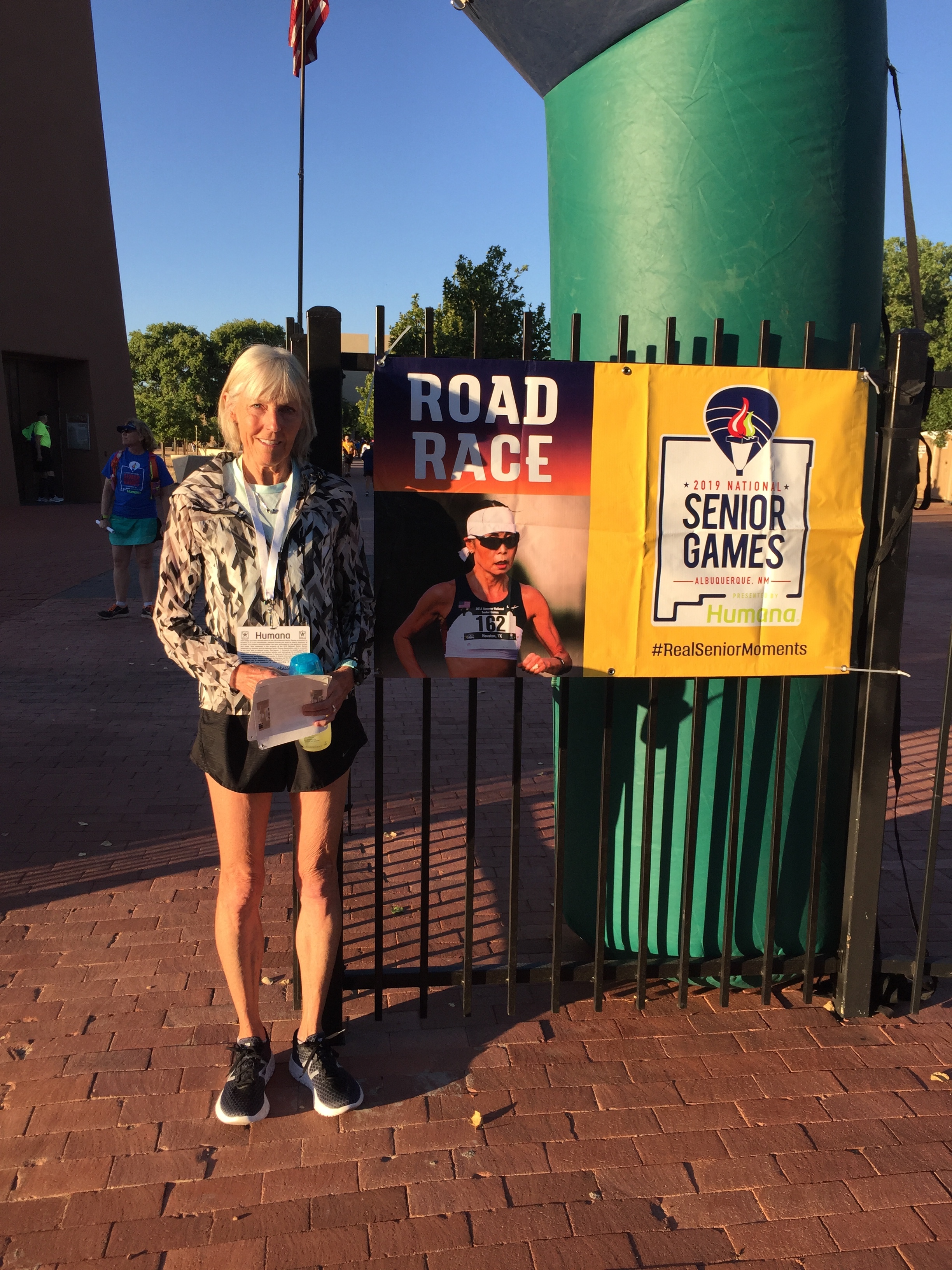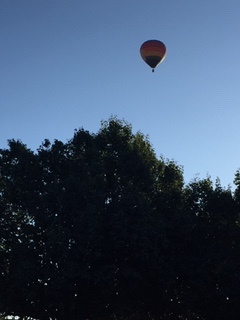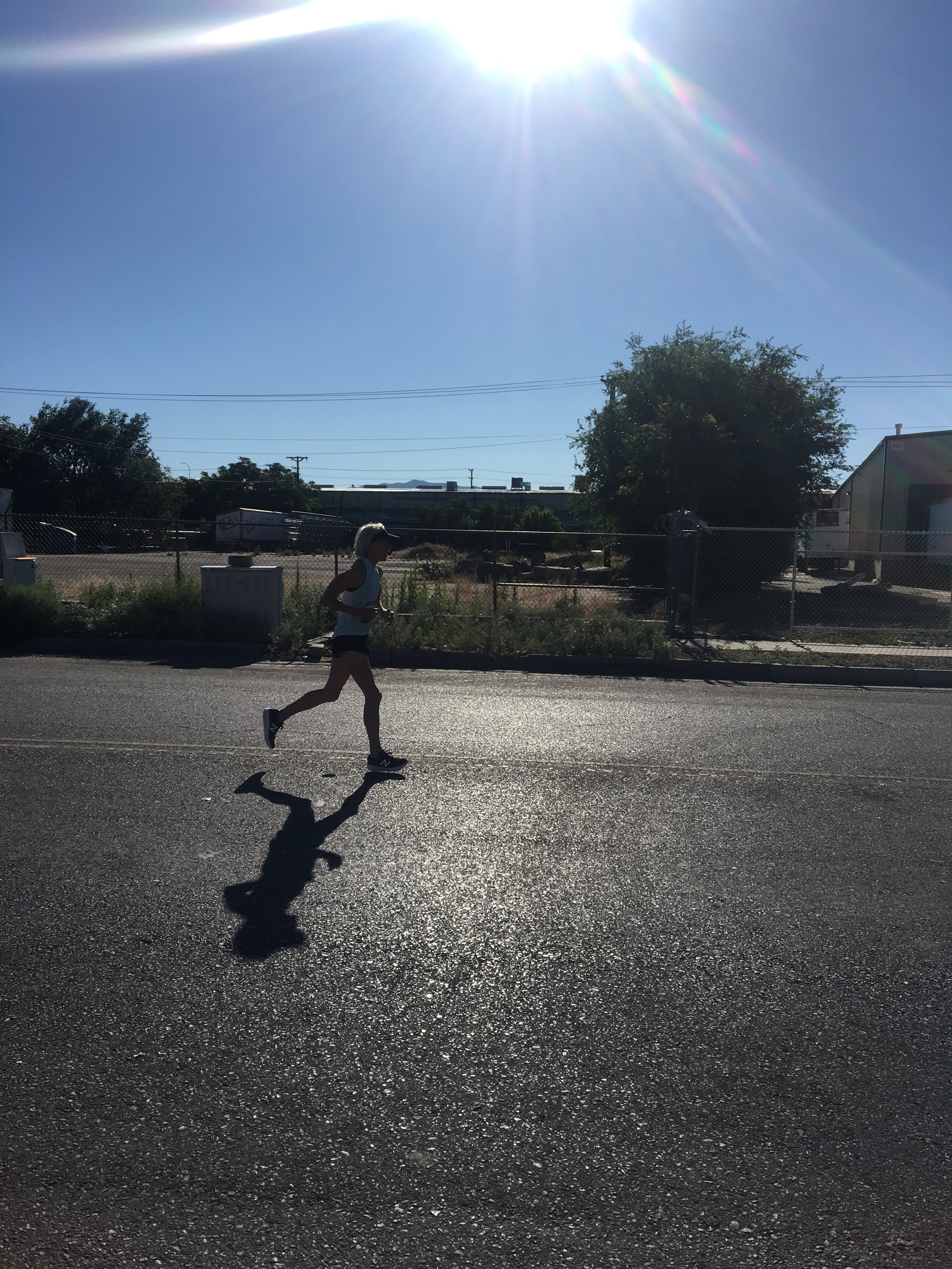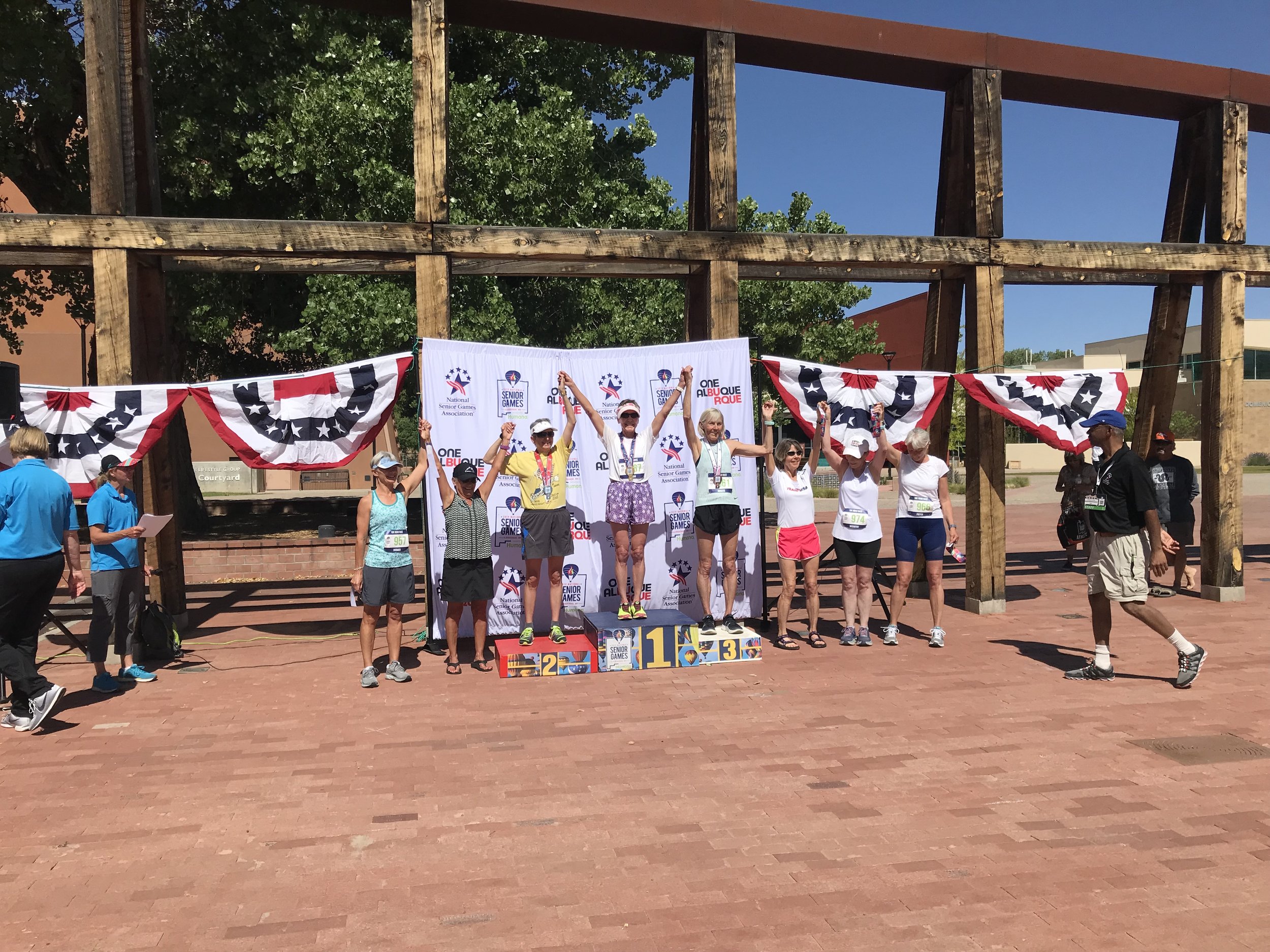Pre-race with the glorious New Mexico sun and clear skies.
I don’t remember exactly when I decided to try to qualify for the National Senior Games. I hadn’t heard of them when I was first eligible to compete (age 50) but then, I still had my younger son, Alex, at home. The logistics are a little daunting, needing to qualify at states’ games in even-numbered years with the biennial national games held in odd-numbered years. Some states allow non-state residents to compete but with a preference to residents for slots (generally, first, second, and third place participants in a particular sporting event qualify; one can also qualify by meeting certain cut-off times). The sports are varied, everything from track and field events to power walking, team sports (e.g., volleyball, basketball, tennis, pickleball, golf, and badminton), road racing (5k and 10k), and triathlon.
Over the years I’ve met a few people who participated in the national games: pole vaulting, power walking, swimming, running, etc. They seemed highly committed to their events and the camaraderie of the other participants, reconnecting every two years, advancing to different age categories (most of the individual events are grouped in five-year increments, e.g., 50-54, 55-59, up to 100+, not dissimilar to the road races I’ve done), embracing new participants, spectators, volunteers, and race organizers.
Running has been deep within my spirit and soul for so many years, yet I don’t truly enjoy racing; I am often anxious and sleepless before difficult training cycles or races, questioning my experience or skill level. I am generally competitive with myself, how I can improve over time (even though time is not always gentle or compatible with getting older), the necessary ancillary work-outs like core and strength training, the frequent albeit not always big injuries.
Despite the logistics and lingering injuries, I qualified for the National Senior Games to be held in Albuquerque, NM, in June 2019, last October at the Huntsmen World Senior Games in St. George, Utah. I decided to only try to qualify in the 10k road race (learning later that many participants engage in a number of events, which makes sense, given the time and effort to attend): although with some elevation (3,700’ at start), this was a mostly-downhill course. There were four women in my age group; we played tag, passing and being passed until my break-away at about mile four. I won this event in my age group with a good qualifying time. I studied runners and their results from previous games and thought (silly me) that I would be competitive at the national level. Now remember, these are women who all qualified in their respective states, some of the best senior runners in the country, even some with USATF masters’ records. Still, I had my qualifying time and wanted a new challenge. There was nothing in my way to register for the National Senior Games in 2019.
Fast forward to early spring 2019 when my training for the 10k formally started. I chose a plan with two days of speed/interval work, four days of easy running (from mid-to-longer distances) and one rest day. I was diligently following the plan until surgery for a ruptured tendon in my right thumb in February threw the schedule off, preventing any activity (especially running) for a month, then slowly re-engaging. Travel (almost every two/three weeks all spring) also interfered with my training routine, consistent only in its inconsistency. Still I had some good track sessions the weeks before race day.
My anxiety kicked into high gear the days before the race. Instead of a leisurely drive to Albuquerque via a few days in Santa Fe, we were in Pennsylvania helping with our grandchildren. I would not have missed that time for anything (Solomon learning to ride his pedal bicycle and Lydia crawling and standing), still, the time change and rain didn’t help my confidence. We flew to Albuquerque on Friday, visited Santa Fe on Saturday, dinner that night with two women I’d met through Kathrine Switzer’s 261Fearless non-profit organization. They’d been at the games for several days and were so enthusiastic. How could I not want to do this?
My brother started texting me about our great-grandfather G.B. Gillie, who’d held the US amateur race walk 50-mile record (he established 100-mile and 50-mile records in 1878) for almost 90 years, only to be broken in 1966 by a Yale man. Gillie was tall and slender, a natural walker, a Scottish man. “Remember Gillie. Think of him when the going gets tough. Have him be your inspiration. Follow his determined spirit.” How could I not go forward with my little 10k with that family history?
Albuquerque is hot with an altitude of 5,312’, similar to Boulder (where I have the hardest time; my BolderBoulder 10k times are always much slower than racing near sea level). I had several goals for this race: an aggressive pace; a medium pace; negative splits (meaning, running the first miles slower than the last miles); and a podium finish (first, second or third in my age group). Accomplishing any of those goals would make me happy, I mused. I kept the goals to myself until race week: my older son strategized with me about the pace and negative splits; my husband thought I might be reaching a little high to place at the national level. It was all magical thinking by race morning.
Fortunately, it’d cooled a bit on Sunday, race day: slightly breezy with temperatures in low-to-mid sixties for our 7:30 a.m. start. The course was out-and-back along the Bosque Trail, mostly shaded, “dead flat,” which can be good, although I prefer a few hills with some good downhills to help me pick up my pace. Racers started arriving an hour and a half before the start, enthusiastic, friendly, giving advice about the start, pointing out some tough competitors, spotting the ubiquitous hot air balloons in the horizon rising up above the course. My pre-race jitters kicked in; my calves were tight from air travel; my butt was biting. No turning back now, though, I did not want a “DNS” (did not start). I was committed!
Hot air balloon before the race started.
After the color guard, singing of the national anthem, and recitation of the Pledge of Allegiance, we were off. The three hundred or more runners started their watches, merged together around the first two tight corners of the course, then spread out along the asphalt trail. At mile one, my pace was fifteen seconds behind my plan but I was concerned about increasing speed at that altitude: lack of breath quickly gives me wobbly legs, so I held steady pace. The air temperature felt good, the rhythm was comfortable, but I realized my goal pace was very likely not going to happen. My mouth and throat were so dry, early in the race; I’d have to stop and drink at the aid stations, which would cause me to lose a few seconds each time. I’d brought a mint life-saver, which I’d never done before, thinking I could suck on it to moisten my throat. The problem: it was stuck in my pocket so I stopped for another 20-30 seconds to retrieve it. It helped, but again, the clock continued to tick away.
I spotted another runner in my age group slightly ahead of me (we wore our age categories pinned to the back of our shirts so we can figure out who is the competition for placing among the top eight, for which ribbons and/or medals are awarded). At the Huntsmen games last fall, I picked off the runners one by one. Sunday, I did not have either the physical (debating that one in hind sight) or mental energy to do so. I should have been able to pick up speed to pass her; instead, I stopped—twice—to catch my breath. She slowly gained space between us. I didn’t know if there were others in my age group ahead of her, but that day, that race, I couldn’t do anything about it.
Almost to the finish line!
Finally, I reached the bridge, a slight uphill, then two corners and a straight shot to the finish line. I didn’t sprint, knowing I’d missed the opportunity to catch the woman who turned out to be in second place. I wasn’t totally spent or out of breath at the finish; I hadn’t executed the race very well. Almost eight months planning out the window. The “I wish I could do it over” syndrome took hold.
Doug met me at the finish line and then we waited an hour for the awards. We chatted with several women I’d met. I was congratulated by several others who commented that I “raced really well!” Hard to accept compliments when one is disappointed with one’s performance.
The awards ceremony was joyous: everyone so enthusiastic and pleased for those runners who placed in the top eight in each age category and especially for the three who placed first, second or third. When my age group winners were called, we stood on the podium and all held hands high. Family and friends’ cameras and iPhones recorded our victories.
Age group winners (third place finish for me).
Reflected on the day’s events forty-eight hours later, my perspective has changed. My father played senior national’s tennis after he retired. He and my mother truly enjoyed the days together with other players, commenting, always, that it was the “fellowship” as much or more than the ability to play tennis that kept them going back to the tournaments. I could see that in the men and women with whom I spoke about the National Senior Games, many of whom had been attending events in various cities around the US for years. The woman whom I met at the Huntsmen games last October came up to me after our podium awards and re-introduced herself to me. She remembered our race and my win, there. I remembered she’d only run because she had a few days in between her swimming events. Fellowship, definitely.
I am proud that I placed third: it was, after all, one of my stated goals. National games, tough competition (and getting harder each year as more and more seniors focus on “actively aging”), thirty-three women in my age group, all having qualified to run. So, I will take my podium finish, work on the execution pieces, embrace the fellowship, and try to find races at sea level!



